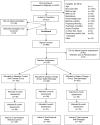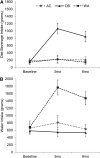Replacing caloric beverages with water or diet beverages for weight loss in adults: main results of the Choose Healthy Options Consciously Everyday (CHOICE) randomized clinical trial
- PMID: 22301929
- PMCID: PMC3632875
- DOI: 10.3945/ajcn.111.026278
Replacing caloric beverages with water or diet beverages for weight loss in adults: main results of the Choose Healthy Options Consciously Everyday (CHOICE) randomized clinical trial
Erratum in
- Am J Clin Nutr. 2013 Dec;98(6):1599
Abstract
Background: Replacement of caloric beverages with noncaloric beverages may be a simple strategy for promoting modest weight reduction; however, the effectiveness of this strategy is not known.
Objective: We compared the replacement of caloric beverages with water or diet beverages (DBs) as a method of weight loss over 6 mo in adults and attention controls (ACs).
Design: Overweight and obese adults [n = 318; BMI (in kg/m(2)): 36.3 ± 5.9; 84% female; age (mean ± SD): 42 ± 10.7 y; 54% black] substituted noncaloric beverages (water or DBs) for caloric beverages (≥200 kcal/d) or made dietary changes of their choosing (AC) for 6 mo.
Results: In an intent-to-treat analysis, a significant reduction in weight and waist circumference and an improvement in systolic blood pressure were observed from 0 to 6 mo.Mean ((±SEM) weight losses at 6 mo were -2.5 ± 0.45% in the DB group, -2.03 ± 0.40% in the water group, and -1.76 ± 0.35% in the AC group; there were no significant differences between groups [corrected]. The chance of achieving a 5% weight loss at 6 mo was greater in the DB group than in the AC group (OR: 2.29; 95% CI: 1.05, 5.01; P = 0.04). A significant reduction in fasting glucose at 6 mo (P = 0.019) and improved hydration at 3 (P = 0.0017) and 6 (P = 0.049) mo was observed in the Water group relative to the AC group. In a combined analysis, participants assigned to beverage replacement were 2 times as likely to have achieved a 5% weight loss (OR: 2.07; 95% CI: 1.02, 4.22; P = 0.04) than were the AC participants.
Conclusions: Replacement of caloric beverages with noncaloric beverages as a weight-loss strategy resulted in average weight losses of 2% to 2.5%. This strategy could have public health significance and is a simple, straightforward message. This trial was registered at clinicaltrials.gov as NCT01017783.
Figures



References
-
- Duffey KJ, Popkin BM. Shifts in patterns and consumption of beverages between 1965 and 2002. Obesity (Silver Spring) 2007;15:2739–47 - PubMed
-
- Dhingra R, Sullivan L, Jacques PF, Wang TJ, Fox CS, Meigs JB, D′Agostino RB, Gaziano JM, Vasan RS. Soft drink consumption and risk of developing cardiometabolic risk factors and the metabolic syndrome in middle-aged adults in the community. Circulation 2007;116:480–8 - PubMed
Publication types
MeSH terms
Substances
Associated data
Grants and funding
LinkOut - more resources
Full Text Sources
Other Literature Sources
Medical
Miscellaneous

